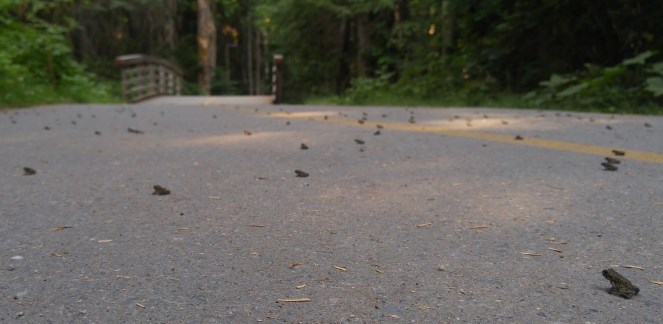Heading to Lost Lake for dip this weekend? Make sure to look before you step.
Starting Saturday, Aug. 20, the lake's access road and parking lot will both be closed until further notice to accommodate the annual Western Toad migration, the Resort Municipality of Whistler (RMOW) announced in a release Friday.
"The duration of the closure is difficult to predict, however, past closures have lasted for an average of two weeks," the RMOW explained, as thousands of tiny toads make their way from the shores of Lost Lake to the nearby forest.
Beachcut Trail and Lost Lake Beach Trail will also remain closed during the migration to protect the sensitive species. The beach, lawns and docks will stay open for now, but may be subject to closure depending on the toadlets' preferred migratory pathways, as those can vary from year to year.
The municipality's free Lost Lake Shuttle will continue to run from 11 a.m. to 6 p.m. every day during the access road closure, but will be subject to a minor route change. Visitors will now be dropped off at the Blackcomb Way entrance to Lost Lake Park. From there, park-goers can walk 400 meters down the Valley Trail to reach Lost Lake's beach and lawns.
Visitors are also welcome to walk or bike into the park along the Valley Trail, where they'll be treated to a firsthand look at the migration. Naturalists will also be on hand to educate park visitors about the toads, while the Whistler Bike Valet will continue to offer free, secure, bicycle parking at Lost Lake every Friday through Sunday throughout the summer.
"Toads can be found throughout the Park so please watch your step, pay attention to posted signage, and walk bikes through posted migration zones," the municipality advised.
"Residents and guests are encouraged to be careful, be respectful and help the little guys make their way home."
What's the deal with Whistler's Western Toads?
The toadlets' annual journey kicked off last month, with the migration phase usually spanning two to four weeks between the end of July and end of August.
The species is native to B.C. and is sensitive to environmental changes, but the tiny amphibians are especially vulnerable during the tadpole and toadlet stages of their life. They're about the size of a dime during the migration phases, meaning they can easily be crushed underfoot or by bike tires. Despite their size, "the Western toadlets are an integral part of the Lost Lake ecology," according to the municipality, helping to keep the popular lake clean.
Though human activities and developments have also resulted in the loss of suitable habitats and created migration barriers for Western Toads, the municipality has worked on a range of temporary and permanent measures to protect the species in recent years. That includes constructing strategically-placed underpasses in Lost Lake Park and installing a log retaining wall along Lost Lake beach that will, ideally, discourage the toadlets from migrating through park lawns where "historic mortality numbers have been very high."
With each female toad laying up to 20,000 eggs it's difficult to pinpoint exactly how many toads will travel from the lake shore to the forest each summer, but the number usually falls somewhere in the range of 35,000 to 40,000. The RMOW said this years breeding pair count peaked at 40 pairs, "our best indicator of estimating population size."
Last year, the municipality logged 102 breeding pairs of Western Toads in Lost Lake.
Interested in helping out with this year's migration? Contact the RMOW's Environmental Stewardship Team [email protected] to learn about volunteer opportunities.



